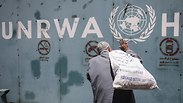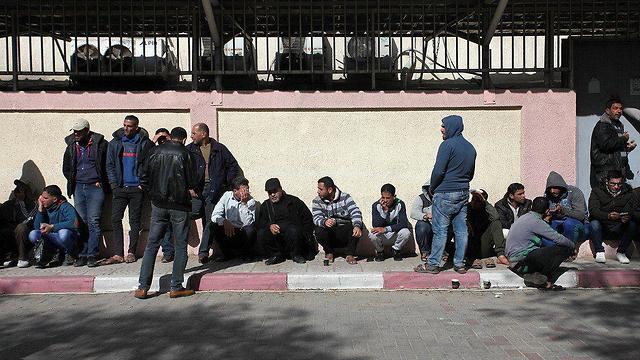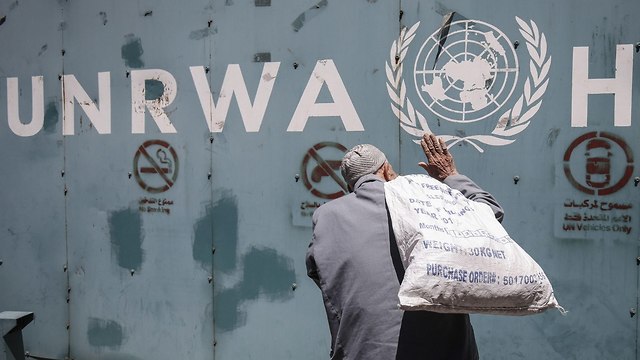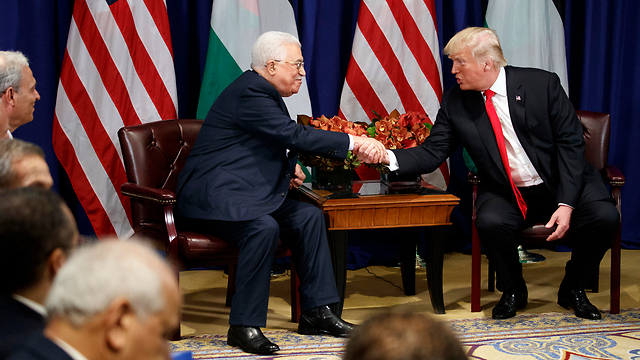
Palestinians see American aid cut as devastating, but not deadly
PA official says 'inhumane' loss of US funding will have negative impact, but they will make up shortfall elsewhere; meanwhile, USAID staffers are regretful as organization closes its doors in West Bank and Gaza.
“The complete cut of the American aid money won’t end the Palestinian economic cycle,” says Azmi Abd al-Rahaman, spokesman for the Palestinian Economy Ministry. He said that while there would be a negative impact on the economy, the US would also pay a price in terms of lost respect.
“Most of the American aid money goes towards humanitarian aspects; thereafter, cutting these amounts is considered inhumane,” he says.
Al-Rahman says that because Palestine has been suffering under Israeli occupation for so many years, the aid money from donor nations is significant, and is vital to building the economy as a developing country.
“Most of the international economic agreements in regard to the Palestinian economy were signed in the presence of the United States and with its approval,” Al-Rahman explained. He said that because the American aid money is fundamental to the Palestinian economy, cutting it is illegal and immoral.
“Ninety percent of our economic resources are controlled by Israel, as well as the land, air and sea crossing-points,” he says. So, while the Palestinian economy does need help, the PA is approaching Arab countries to fill the gap, secure the economy “and embarrass the US.”
Previously, citing concern over issues of corruption and misuse of funds, US policy shifted to provide aid directly to specific projects rather than through the PA treasury. Most of the recipients were development projects carried out by the United States Agency for International Development (USAID), which is now closing its doors in the West Bank and Gaza.
The loss of these USAID projects translates into three main areas: Governance and Civic Engagement – where its partnership with the PA helped improve municipal services and strengthen the institutional capacities of 72 municipalities; Human Capital and Social Impact; and Economic Growth and Infrastructure.
In the educational sphere, USAID has since 2000 reduced class sizes by constructing nearly 3,000 classrooms and training 4,300 teachers and principals, resulting in increased student performance. Moreover, its investments in the health fields have helped provide more personnel in 274 medical facilities.
During the past five years, USAID has leveraged $86 million in private sector investments to scale up and improve the quality of business services and production, and fostered Palestinian partnerships with over a dozen US companies. Its investments have also improved access to clean water for more than 1.4 million Palestinians; installed 1,360 kilometers of water pipelines; built or renovated 53 water reservoirs; drilled or renovated 33 wells; and connected 140,000 Palestinians to running water for the first time.
A number of those responsible for the USAID projects have expressed regret over the cuts.
“We’re leaving so many things unfinished and not following through with the commitments we made to our stakeholders,” says Ally, a former USAID project employee who asked to withhold her full name as she is not authorized to speak to the media. She says that the project she used to work on, which started two years ago, was originally supposed to end in September 2019, but they have now been informed that all technical aspects must be shut down by January 31.
“This puts a lot of pressure on us to get as much done as we can in an incredibly short period of time,” Ally says. “Not only does (the premature shut-down) impact the legacy that USAID and implementing partner organizations will leave behind in Palestine, but it could also have very detrimental effects on the sectors in which these projects worked, and by extension, the Palestinian people.”
Palestinian-American relations have been tense since December 2017, when the PA imposed a diplomatic boycott on the American administration—protesting its recognition of Jerusalem as Israel’s capital—a move many Palestinians regard as biased. In 2018, the American administration ceased sending aid money to the PA, except for funds earmarked for security projects and programs.
“The American administration in the era of Trump moved from finding a solution to the Palestinian-Israeli conflict to forcing the Israeli solution on the Palestinians,” says Palestinian political analyst Hani al-Masri.
Al-Masri says that the latest decision is as part of planned steps intended to end the Palestinian cause.
“I believe they are pressuring the PA to a limit that they will accept or at least negotiate the ‘deal-of-the-century,’ rather than just refuse the unrevealed plan,” he says.
“Previously, international resolutions were the reference for negotiations, despite the fact that Israel has never fully committed to them. Nowadays, we have no base or reference, (other than) Israel’s best interests—and the Israelis want everything!”
Article written by Dima Abumaria, and reprinted with permission from The Media Line













